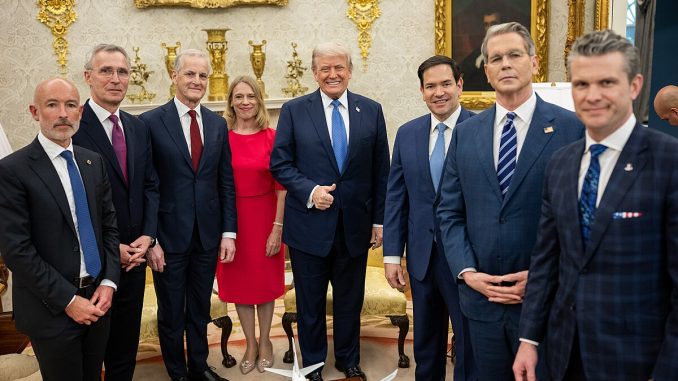Peloni: Background for Trump’s recent Sanctions Tweet which focused on Iran and China. Importantly, Ghasseminejad’s recommendation of applying sanctions to companies and individuals involved in, and/or responsible for, the shipping Iranian oil is a vital addendum which should be pursued. Doing so will increase US leverage over both Iran and China.
Saeed Ghasseminejad | April 30, 2025
 President Donald Trump poses for a photo with Prime Minister Gahr Store of Norway, Thursday, April 24, 2025, in the Oval Office. (Official White House Photo by Daniel Torok)
President Donald Trump poses for a photo with Prime Minister Gahr Store of Norway, Thursday, April 24, 2025, in the Oval Office. (Official White House Photo by Daniel Torok)
Shortly after President Donald Trump started his second term, his new Treasury Secretary, Scott Bessent, promised, “We are committed to bringing the Iranians to going back to the 100,000 barrels a day of oil exports.” Fulfilling that commitment appears far off.
In February, Iran exported 1.7 million barrels per day, mostly to China; the following month, Iran’s oil exports declined slightly but were still 15 times Bessent’s goal. Simply put, absent an effective strategy to counter China’s purchase of Iranian oil, it will be difficult to make sanctions against Iran effective.
The difficulty lies in the complex network facilitating Iranian oil exports and Beijing’s efforts to keep Tehran afloat. Over the years, Tehran has fine-tuned its sanctions evasion, including ship-to-ship transfers, falsified documentation, and the use of “shadow fleets.” To counter these, Washington must be willing to impose real pain on Beijing to coerce a change in behavior.
It is critical to focus on end-users in China. U.S. authorities must not only exert diplomatic pressure on Beijing but also apply primary and secondary sanctions to entities that trade with Iran, especially those with an international footprint. Earlier this year, the United States targeted a small Chinese private refinery for the first time. It is essential to target Chinese refineries that are processing Iranian oil, but the U.S. Department of the Treasury should also use its designation authority to designate the entities that buy their products further. Targeting board members and key managers of these companies increases the effectiveness of sanctions.
An escalation of the tanker confiscation campaign is necessary. The U.S. Navy and allied maritime forces should seize vessels engaged in illicit Iranian oil transport. This necessitates enhanced intelligence gathering to identify and track these vessels and a legal framework to facilitate confiscation and asset forfeiture. The message must be clear: Engaging in Iranian oil trade carries immediate financial consequences. Iran will try to retaliate in the Persian Gulf and Gulf of Oman, so the U.S. and allied navies must be prepositioned to deter and respond.
The designation of key economic operatives is also essential. The Trump administration sanctioned Iran’s oil minister in March. A horizontal and vertical expansion of such measures is necessary. The Treasury Department must prioritize the designation of board members, executives, and major shareholders of entities facilitating sanctions evasion.
Washington should also move beyond the designation of shadow fleets to ports and port operators, storage facilities, banks, and insurance providers that facilitate Iranian oil exports. Disrupting these nodes can further limit Iran’s ability to access global markets. The Chinese banks that store or transfer Iran’s oil revenue would be prime targets.
Covert actions targeting key sanctions busters are also necessary. Washington should deal with Islamic Revolutionary Guard Corps financiers the same way it deals with ISIS and al Qaeda financiers. This would involve strategic disruption of critical nodes in the Iranian oil trade network, including individuals and entities that facilitate sanctions evasion.
According to the Biden administration, 27 nations facilitate illicit oil trade between Iran and China. Clear and consistent communication from the State and Treasury Departments, outlining the consequences of sanctions evasion, especially to partners such as the United Arab Emirates and Turkey, is essential. A united front, involving key allies and international organizations, can amplify the effect of sanctions, though it may require coercion against partners disinclined to take the Iran threat as seriously.
U.S. policy is at its weakest when it confuses rhetoric with reality. The goal of reducing Iran’s oil exports to 100,000 barrels per day is welcome, but absent a systematic strategy to fulfill that goal, it will remain an aspiration. There is simply no way to fulfill Bessent’s goal absent tackling Beijing’s dual desires to profit from discounted Iranian crude and empower Tehran in its war by terrorist proxy.
Saeed Ghasseminejad is a senior adviser for Iran and financial economics at the Foundation for Defense of Democracies, specializing in Iran’s economy, financial markets, sanctions, and illicit finance. Follow him on LinkedIn and X @SGhasseminejad



Leave a Reply
You must be logged in to post a comment.